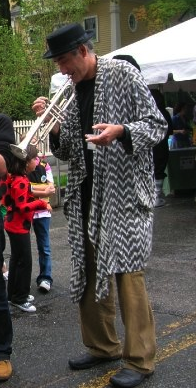A reader finding an old post and wanting to post a comment about it can be a dose of cod liver oil to a blogger. You re-read the old post with a spirit similar to that of a musician forced to listen to an old solo.
Thus, I revisited my post "Ten-reasons-why-best-of-lists-suck," written in reaction to a rash of Top Ten Lists. Older but no wiser, I have retractions and emendations to make:
1. Usually there's no commentary at all to validate a listing. If there is, it doesn't.
Mangled syntax(but I still believe it).
2. Hyper-selectivity is anathema to discovery. Stumbling through a thicket of sound leads to real discovery, not following a road map.
No. There's as much to discover on the microcosmic level as there is on the macrocosmic. A careful listening to a single vein of music, if it's fertile enough, can provide as much fuel as a scattershot approach.
3. Listing is something you do when you walk back to your cabin after drinking to forget that the ship is about to capsize.
Well, number 3 on a list is always tough to think of, but mea culpa for this clumsy metaphor.
4. Inclusiveness doesn't work. The more people you ask to help produce a list, the more the juice is sucked out.
True, unless people are asked to critique each other's choices.
5. The Net's about self-aggrandizement; no one argues with that. Can't ya be a little more subtle about it?
Hey-you talkin' to ME?.
6. It may be possible that someone could go to a friend's house for a listening session and say "Play me your top ten Zoot Sim's records." OK, but there are so many more interesting ways to go from one side to the next that if you actually did spend the night with these 10 albums, I'd recommend seeking treatment for OCDC.
The treatment is coming along nicely, thank you.
7. By reifying the 'experts,' lists decrease, they don't increase, the flow of actual communication. Trust your friend's musical advice, not a stranger online.
Yes, except me.
8. At least keep the list short. The larger the list, the harder it falls.
Jimmy Cliff's lawyers are on my tail.
9. Getting on such lists only misleads musicians into thinking their gigs will improve.
Yes. It has not been and will never be effective publicity to say:"I was number 9 on Joe M. Figgs' top ten list-but he said the list was in no particular order."
10. You've probably stopped reading this list by now, which only goes to prove my point.
At least I was right about this.




.jpeg)
.jpeg)
.jpeg)
.jpeg)








.jpeg)

.jpeg)